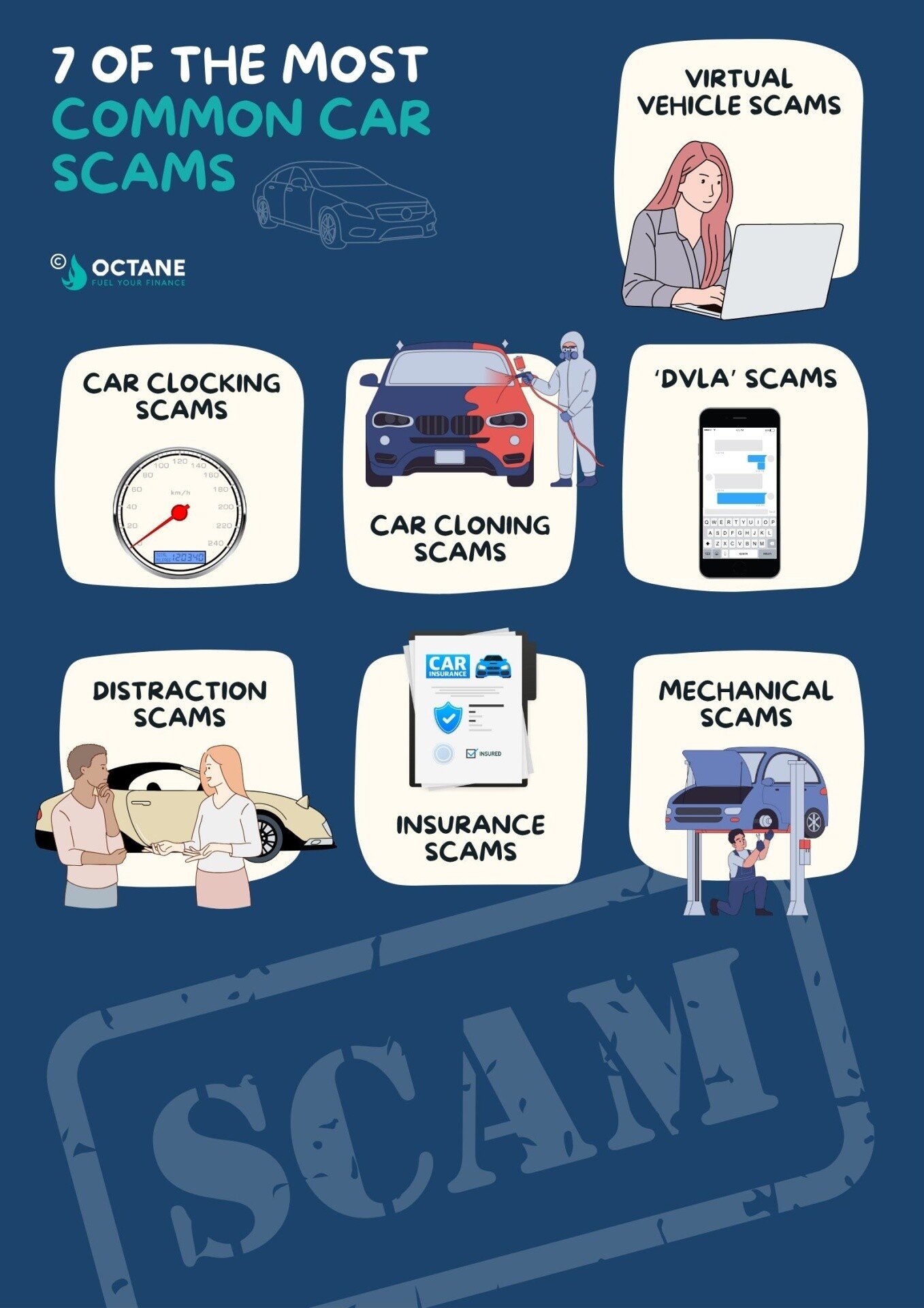The most common car scams
Be aware of the scams targeting motorists in the UK and how to avoid them
In recent years, the UK has witnessed an unprecedented surge in used car sales, with the market reaching all-time highs since COVID-19. While this boom offers excellent opportunities for both buyers and sellers, it has also made way for an abundance of fraudsters looking to exploit unsuspecting motorists.
Here at Octane Finance, we believe that being well-informed is your best defence against falling victim to these schemes. While the vast majority of used car purchases proceed smoothly, it's still crucial to remain vigilant at all times.
Scams can target not just those actively buying or selling vehicles, but even current car owners, who may succumb to MOT and servicing scammer schemes. These types of fraudulent activities can catch anyone off guard, potentially leading to significant financial losses and legal complications.
To help you navigate this landscape safely, we've compiled a comprehensive guide highlighting the most common car scams in the UK - we even provide actionable tips and strategies so you can help protect yourself.
Whether you're in the market for a new ride or simply want to safeguard your current vehicle, our top tips will provide you with the knowledge to spot red flags and avoid potential pitfalls.
Read on to find out more…
Key Takeaways
- Common scams include virtual vehicle scams, car clocking, car cloning, fake DVLA communications, distraction tactics during private sales, insurance scams, and mechanical fraud.
- Always verify seller identities and vehicle histories before making a purchase.
- Be wary of deals that seem too good to be true - they usually are!
- Use only reputable platforms and approved garages for transactions and services.
- Never share personal or financial information in response to unsolicited communications.
- Stay informed about current scams and fraud tactics in the automotive industry.
- Report any suspected scams to the police and relevant authorities immediately.
Virtual Vehicle Scams
With so many cars being advertised online, it’s easy to be lured into a virtual vehicle scam. These adverts are actually fake, tempting potential buyers by luring them in with low prices. In this instance, use your common sense; if an offer sounds too good to be true, that’s because it usually is!
If a car is advertised as being located outside of the UK, this is an initial red flag. Scammers will usually send potential buyers to a fake website which will encourage you to transfer money for so-called ‘shipping costs’, making empty promises of when the purchaser can expect delivery of the vehicle that never arrives.
How to avoid them:
- Always verify the seller's identity and location
- Be cautious of deals that seem too good to be true
- Conduct a thorough online search of the vehicle and seller
- Never transfer money for "shipping costs" without seeing the vehicle in person
- Only use reputable car selling platforms or authorised dealerships
Car Clocking Scams
As a motorist, you’ve no doubt heard of the term ‘clocking’. This is a way of reducing the current mileage of a vehicle, so it appears to have less miles-on-the-clock. Low mileage cars naturally attract buyers and higher prices, which is why fraudsters engage in the illegal practice of clocking.
Thanks to the introduction of digital odometers, car clocking scams have reduced, but it is still an ongoing problem - especially in older vehicles. Worryingly, it's estimated that over two million cars currently on UK roads are being driven with the incorrect mileage.
How to avoid them:
- Check the vehicle's service history and MOT records for mileage consistency
- Use online tools to verify a car's mileage history
- Look for signs of wear and tear that don't match the stated mileage
- Consider getting a professional vehicle inspection before purchase
Car Cloning Scams
Many motorists are falling foul to car cloning scams which are sadly on the rise. Car cloning is the process of stolen identity; usually fraudsters will duplicate a car’s registration plate, using it for a vehicle of the same make and model which has been stolen or salvaged, and is being used to commit crimes.
Worryingly, there is very little you can do to stop your car being cloned. The first you’ll hear of it is if you receive a letter in the post, claiming that you’ve committed a traffic offence or failed to pay a motoring fine. If you suspect your number plate has been cloned, you need to contact the police and DVLA straightaway.
How to avoid them:
- When buying a used car, always check its registration documents carefully
- Use the DVLA's vehicle information checker to verify the car's details
- Be wary of cars being sold significantly below market value
- If you receive unexpected fines or notices, contact the authorities immediately
Devious ‘DVLA’ Scams
If you received an email or text claiming to be from the DVLA, would you trust it? Email and text-based car scams are on the rise and in recent years, fraudsters have been acting under the guise of the DVLA to con unsuspecting drivers.
These types of texts and emails claim to offer road tax refunds, encouraging car owners to click on a link and fill out their details - including bank information. What’s important to remember is that the DVLA will never contact motorists via emails or text messages to ask for payments or confirm personal information. Be alert and be aware!
How to avoid them:
- Remember that the DVLA never contacts motorists via email or text for payments or personal information
- Don't click on links in suspicious emails or texts claiming to be from the DVLA
- Always go directly to the official DVLA website for any transactions or enquiries
- Report suspicious communications to the DVLA
Dirty Distraction Scams
Selling your car privately can be a stressful experience, which can be made all the worse by scammers looking to pay far less to purchase a vehicle. Criminals can use a number of distraction techniques in order to pull the wool over a seller’s eyes…
One such scam is known as the ‘dirty oil trick’, where one scammer will distract the seller, whilst the other will appear to look under the car’s bonnet. Unbeknowingly to the seller, the potential ‘buyer’ is actually pouring oil into the coolant chamber of the vehicle, so when it’s taken for a test drive, smoke will appear from under the bonnet.
How to avoid them:
- When selling your car, always have a friend or family member present during the viewing
- Don't allow potential buyers to distract you or split up during inspections
- Be cautious of buyers who insist on looking under the car’s bonnet without supervision
- If smoke appears during a test drive, have the car professionally inspected before lowering the price
‘Ghost Broker’ Insurance Scams
Finding a good deal on car insurance is a priority for many drivers, but beware of fake insurance companies - referred to in the trade as ‘ghost brokers’. Quite often targeting their victims via social media, ghost brokers promise car insurance policies at the fraction of the price.
Of course, these types of fraudulent cover are null and void, meaning that the criminals have pocketed potentially hundreds of pounds, while you’re left driving without insurance.
How to avoid them:
- Only purchase insurance from reputable, well-known companies
- Be wary of insurance deals on social media that seem too cheap
- Verify the insurance broker's credentials with the Financial Conduct Authority
MOT and Mechanical Scams
While you no doubt use an approved garage to get your car fixed or booked in for its annual MOT and service, not all garages are reputable. In fact, some are known for fraudulent activity by claiming your car has more faults than it actually has.
Less trustworthy mechanics may take advantage of unsuspecting car owners; watch out for overcharging of parts or labour, charging for work that hasn’t taken place, or fabricating a list of extra faults that don’t actually exist. Only ever book your car in at an approved garage - check online via websites such as Approved Garages to be sure.
How to avoid them:
- Use garages approved by reputable organisations
- Get multiple quotes for repairs and compare them
- Ask for detailed explanations of all work performed and parts replaced
- Keep records of all previous work done on your vehicle
- Consider getting a second opinion for major repairs
General tips:
- Always trust your instincts – if something feels off, it probably is
- Do thorough research before making any car-related transactions
- Keep all documentation related to your vehicle and its maintenance
- Stay informed about current scams and fraud tactics in the motor industry
- If you fall victim to a car scam, always report it to the police - no matter how small you think it is - as it may be part of a wider network of crimes
Discover More with Octane Finance
While this guide focuses on protecting you from car scams, it's just the tip of the iceberg when it comes to the wealth of automotive knowledge available on our website.
Whether you're a first-time car buyer, a seasoned motorist, or somewhere in between, our news section hosts a diverse collection of articles designed to inform and assist you.
From financing guides to car maintenance tips and market trends, our articles will help you keep your finger on the pulse - or should we say hands on the steering wheel!


